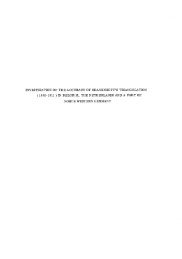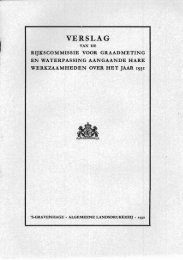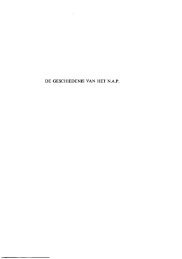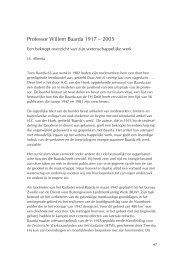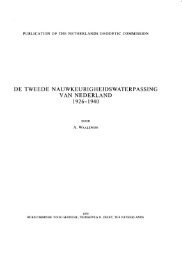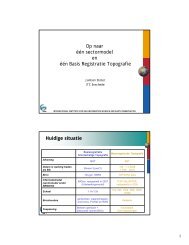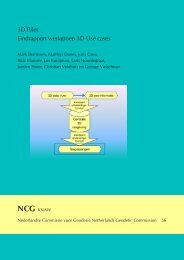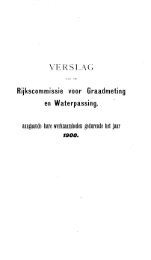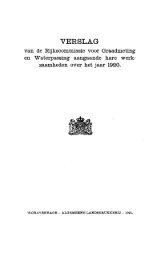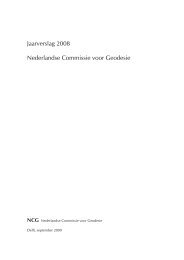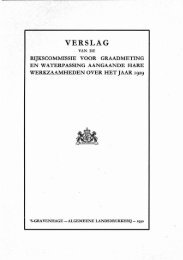SDI Convergence - Nederlandse Commissie voor Geodesie - KNAW
SDI Convergence - Nederlandse Commissie voor Geodesie - KNAW
SDI Convergence - Nederlandse Commissie voor Geodesie - KNAW
You also want an ePaper? Increase the reach of your titles
YUMPU automatically turns print PDFs into web optimized ePapers that Google loves.
Power and Privacy: the Use of LBS in Dutch Public<br />
Administration<br />
Charlotte van Ooijen and Sjaak Nouwt 1<br />
Tilburg Institute for Law, Technology, and Society (TILT), Tilburg University,<br />
the Netherlands, C.W.vanOoijen@uvt.nl<br />
Abstract<br />
There are in the policy fields of traffic management as well as public order and safety in<br />
the Netherlands new applications of location-based services (LBS) such as the public<br />
transport chip card and the use of mobile phone location data in policing. Combining<br />
citizens’ location information and personal data is essential for the provision of LBS.<br />
We explored three cases of LBS in Dutch public administration and argue that LBS<br />
may affect the balance between the roles citizens can have in their relationship with<br />
government: subject, client and citoyen. Consequently, we discuss the concept of privacy<br />
in public places and relate this to European case law. It is important for government<br />
to be aware of the powerful inherent logic of LBS and how this may shape government-citizen<br />
interaction.<br />
Keywords: Location-based Services (LBS), public administration, citizenship, privacy.<br />
1. INTRODUCTION<br />
“As Dutch citizens we are well taken care of by our state. Just look at our beautiful road<br />
infrastructure. Even the tiniest village in the outskirts of the country can be easily<br />
reached. Diverse access ways have been constructed into our big cities. As clients of<br />
our government we are entitled to use this well-maintained system, at a fair price of<br />
course, which is determined by our road tax system. And now the very good news is<br />
that a new pricing system is going to be developed which will be even more efficient<br />
and better tailored towards the individual situation of every citizen. How is this possible?<br />
Luckily, our government is always keen to look at new technological developments<br />
and investigate how we, as citizens, may benefit from these. Consequently, innovative<br />
policy makers have suggested to implement a satellite-based road pricing system<br />
which will be able to tax us based on our actual usage of the Dutch roads. So, we will<br />
only pay for the products we use. A more honest and fairly divided system can hardly<br />
be imagined, or can it?”<br />
This could be the testimonial of a government promoted advertisement for the new<br />
Dutch road pricing system which is due to be implemented starting 2011 (Ministerie<br />
van Verkeer en Waterstaat, 2008). We would almost be inclined to forget that, as clients<br />
of our government, we are not just consumers like in the private market. Citizenship<br />
is shaped by and shapes itself through power structures as vested in our democratic<br />
institutions. Law, politics and administration as well as the civil society and the<br />
media determine the multi-faceted nature of the government-citizen relationship. Consequently,<br />
citizenship has to do with constitutional and democratic rights and duties<br />
along with mutual dependencies of state and society.<br />
1 From 1985 to February 2009, Sjaak Nouwt was an assistant professor at the Tilburg Institute for Law,<br />
Technology, and Society (TILT) of Tilburg University. Currently, he is a policy advisor at the Royal Dutch<br />
Medical Association.<br />
75



